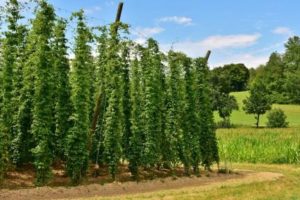Author – Robin Siktberg, Custom Content Editor, Meister Media Worldwide
Hops growers will welcome the news that they have another option for control of broadleaf weeds and basal suckers. With the removal of paraquat from use in hops production due to residue detection above permitted levels, a new herbicide registered for use on hops is needed. In 2002, IR-4 received a request to evaluate residue levels of pyraflufen-ethyl (marketed as Venue® herbicide and manufactured by Nichino America®) on hops in order to apply for a supplemental label registration. Pyraflufen-ethyl is used in orchards and vineyards to control tough weeds and suckers on woody plants. The number of acres of hops grown in the United States is small in proportion to overall US agricultural crops, but it is growing. In 2019, nearly 59,000 acres were planted with hops, primarily in the Pacific Northwest, but plantings were sprinkled among 26 other states as well. This acreage represents a 2.54% increase over 2018.

How Herbicides Are Used in Hops Production
Herbicides are used at two different times in hops production systems. In the spring, emerging shoots in established hops plantings are burned down to remove growth infected by powdery mildew (Podosphaera macularis) from the previous year. Powdery mildew is a serious problem on hops, and new growth can emerge already covered with the white fungus – these are known as “flag shoots.” Once flag shoots are burned down, new, non-infected growth emerges to be trained up the twine for the season’s crop. Of course, the herbicide also kills overwintering weeds to get a clean field.
The second use for herbicides in hops production is in mid-summer once bines are six to eight feet tall. Herbicides are applied to the dense basal growth that continues to grow all season, providing an excellent environment for powdery mildew. Eliminating the basal growth periodically allows better air circulation and less opportunity for powdery mildew inoculum to gain a foothold. Depending on the region and growing situation, hops growers may apply herbicide several times during the growing season. This is another reason an additional herbicide registered for use on hops is welcome news; it allows more rotation between products to slow development of resistance.
“Hops require the use of high quality desiccants to control sucker growth throughout the season,” says Anne George, Executive Director of Hop Growers of America/US Hop Industry Plant Protection Committee. “The lush, young growth that accumulates at the base of each plant after bines that will bear the crop have been trained onto the trellis creates a perfect environment forthe development of hop powdery mildew and can harbor other pests and disease organisms. Pyraflufen-ethyl will be utilized to periodically burn down this growth, increasing air flow at the base of the plant and reducing infestation pressure.”
While existing products work well for these purposes, paraquat use, as mentioned earlier has been banned on hops, and growers would like products with a higher level of worker safety.
Study Protocol
To determine residue levels on hops, researchers at IR-4 tested plots of treated and untreated hops and sent the harvested cones for testing to the University of California-Davis to analyze the results.
In the treated plots, two foliar applications of Venue 2% SC were made at the rate of 0.0053lbs/ai per acre in 20-60 gallons per acre (GPA) using ground equipment. Each application included an adjuvant at the labeled rate, and they were applied at 30-day intervals. Spray was directed to the lower 20-40 inches of the hops plants and extended out 18-24 inches from the base of the plants in each direction.
Both treated and nontreated plots were otherwise managed equally. Thirty days after the second application, cones were harvested from all plots. They were collected from both sides of the plants, from upper and lower parts of the bines, and from both exposed locations and from those sheltered by foliage. Cones were then dried, sent for testing, and met maximum residue requirements. EPA approved the supplemental label for pyraflufen-ethyl (Venue) for hops in September 2019.
For more:
PR# 08708 Hops (Powdery Mildew)
Robin Siktberg is a custom content editor at Meister Media Worldwide; rasiktberg@meistermedia.com.
